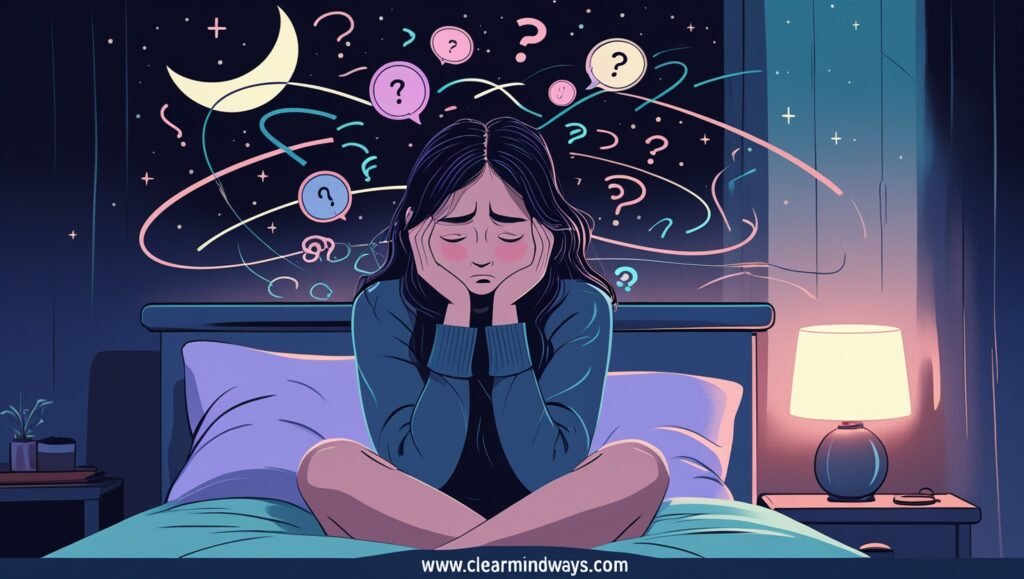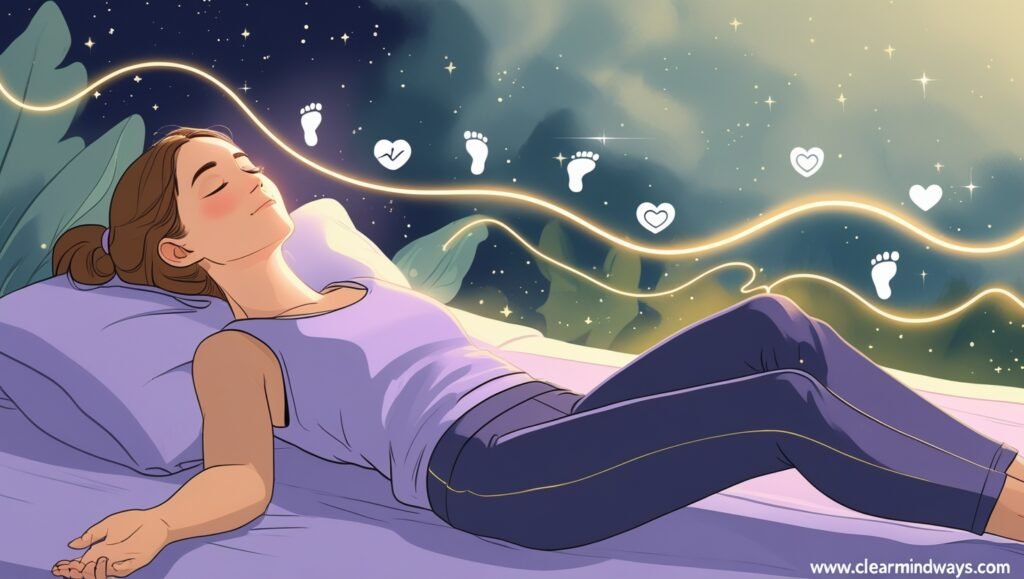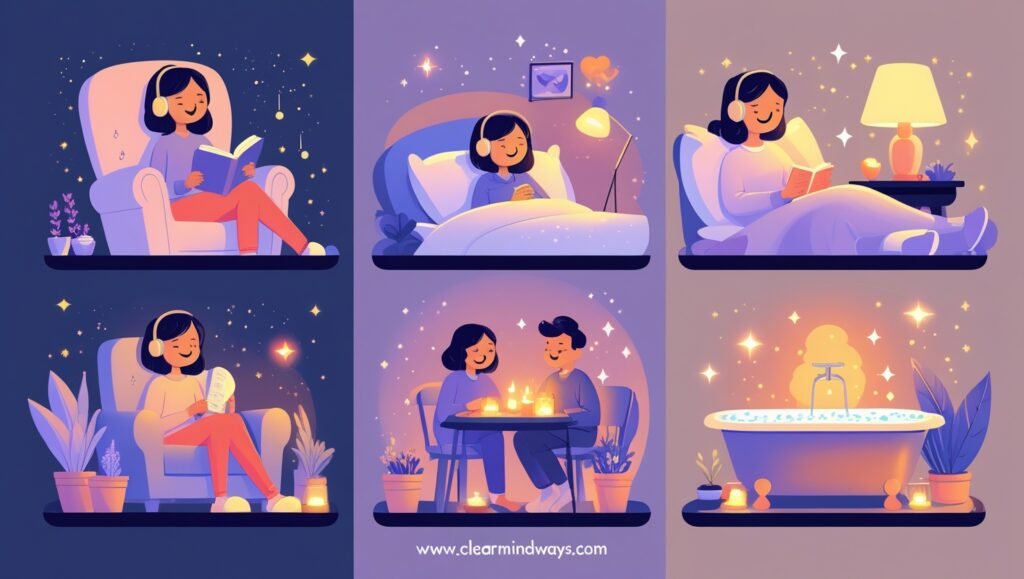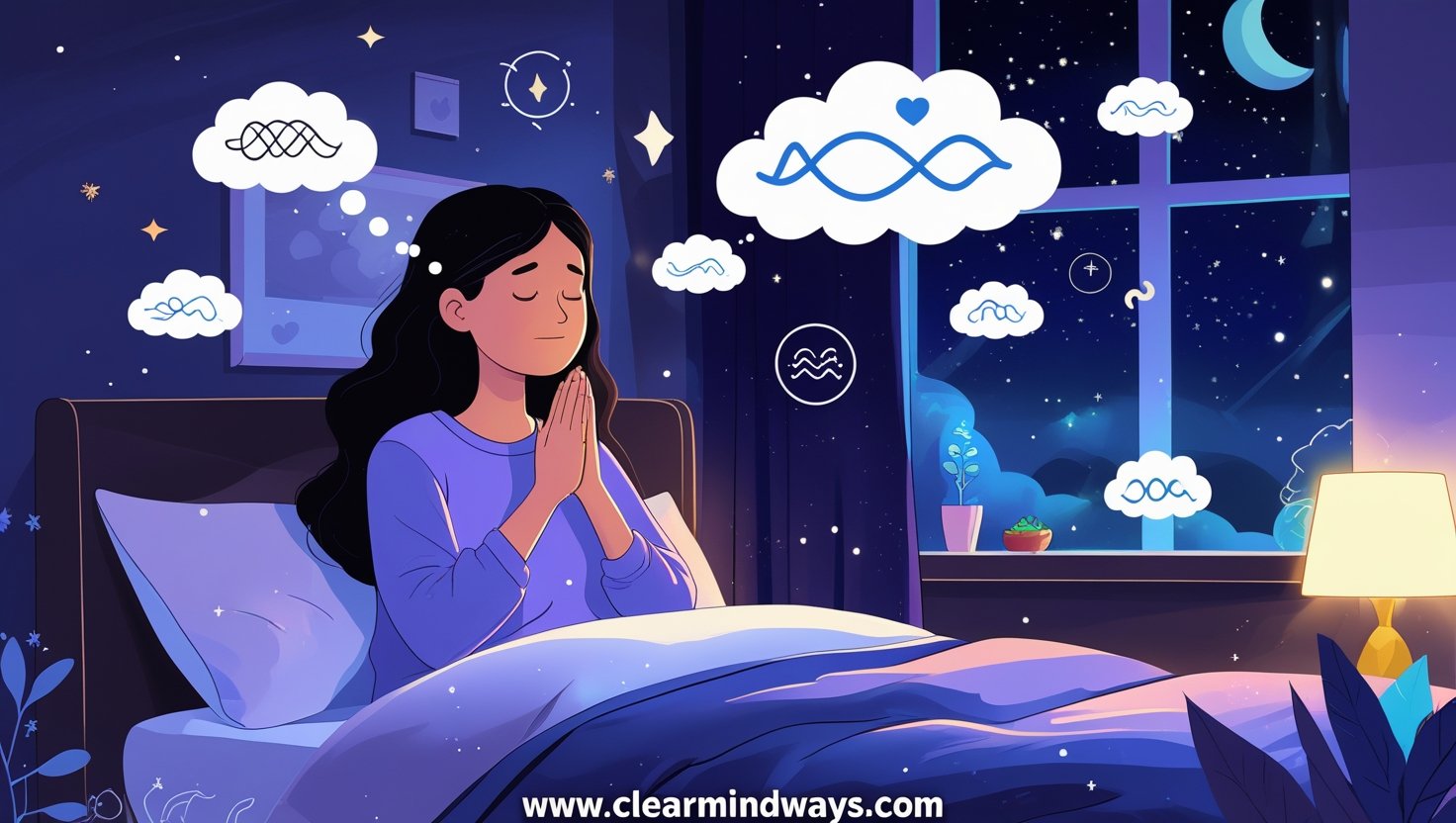Do you lie awake at night, worrying and fearful of what’s to come? You’re not alone. Nighttime anxiety plagues millions of people around the world, transforming a peaceful time of rest into hours of tossing and turning. The good news is there is a multitude of effective options to help calm your worried mind, so that you can get the quality sleep that you deserve.
What Is Nighttime Anxiety?
Nighttime anxiety, or nocturnal anxiety, occurs when worries and fear are at their worst at night or while you are trying to fall asleep. Nighttime anxiety can be more intense than daytime anxiety, because you don’t have the distractions of the day; there is quite and less activity for your mind to wander.
Also, many have some physical symptoms such as a racing heart, sweaty palms or feeling short of breath. Mentally there are racing thoughts, worry about the day after, or replaying the day just gone. These symptoms can really interfere with your ability to fall asleep or to stay asleep through the night.
Why Does Anxiety Get Worse at Night?

Knowing why you feel anxious at night can help you figure out the best approach. Here are the main reasons:
Less Distractions: During the day you have work, conversations, and activities that keep your mind occupied. During the quiet hours at night, worried thoughts have more room to expand.
End-of-day Reflection: Perhaps we think over our day, over what we will have to face tomorrow, or the problem we need to solve. This reflection can trigger anxiety.
Biological Factors: The stress hormone cortisol is meant to naturally decrease during the evening, but anxiety can interfere with this rhythm. Some individuals also have naturally elevated levels of anxiety at particular times.
Worry About Sleep: “If you’ve had a problem with sleep before, you become worried or concerned about the fact you’re not going to get sleep and you sort of get into a cycle of worry about sleep itself,” Rosa said.
Caffeine and Diet: For the same reason you shouldn’t eat before bed, you may find that you’re more anxious in the evening because of what you’ve consumed earlier in the day. Night cap Before bed, avoid caffeine, sugar and heavy meals can lead to restlessness at night.
Related:
15 Proven Ways to Get Rid of Bad Anxiety at Night
1. Create a Calming Bedtime Routine
A regular bedtime routine tells your brain it’s time to transition to sleep. Begin your routine 30 to 60 minutes before you’d like to be asleep. This might include:
- Taking a warm bath or shower
- Reading a book (avoid screens)
- Listening to calm music
- Doing gentle stretches
- Writing in a journal
The key is consistency. Peaceful routine Do the same things in the same order nightly. An artificial environment will coax your brain to associate these activities with slumber, making it easier to relax.
2. Practice Deep Breathing Exercises
One of the quickest things you can do to reduce anxiety is slow, deep breathing. It triggers your body’s relaxation response, slows down racing thoughts. Try the 4-7-8 breathing technique:
- Now, inhale through your nose for 4 counts.
- Hold your breath for 7 counts
- Blow out through your mouth 8 times
- Repeat 3-4 times
Another easy method is belly breathing. One hand on your chest, one on your belly. Slow down your breathing so the hand on your belly moves more than the hand on your chest.
3. Use Progressive Muscle Relaxation

Progressive muscle relaxation Practice this oxymoronic approach (do nothing and feel better) to loosen any physical tension that accompanies anxiety. Begin with your toes and move up the body:
- Tense each muscle group for 5 seconds.
- Let go and breathe for 10 (; seconds.
- What you’re seeing here is the difference between tense (and relaxed)_PROGRESSIVE_MUSCLE_RELAXATION muscles.
- Move to the next muscle group
Not only does this soothe your body, but it also provides your tense mind something specific to zero in on, instead of just worrying.
4. Write Down Your Worries
If something is bothering you, keep a pad by your bed and write it down. This “worry dump” helps to get the thoughts out of your head and on to paper. You can also try:
- Listing everything to do for tomorrow
- Writing three “gratitudes”
- Writing down anything good about your day
Writing can help externalize your worries so that they don’t bounce around in your mind all night long.
5. Challenge Anxious Thoughts
“When one of those thoughts pops into your head, to not just accept it as a fact.” Ask yourself:
- Is this thought realistic?
- What evidence do I have that supports and refutes this worry?
- What Would I Say to a Friend Who Was Worrying About This?
- What’s the worst-case scenario, realistically?
- So how fearful should we actually be of this concerns?
This practice, known as cognitive restructuring, can help you see your anxious thoughts as more objective.
6.Create the Perfect Sleep Environment
You need the right ambient of your bedroom, if you want to relax in peace. Make these changes:
Temperature: Cool room, approximately 60-67° F (15-19° C). When your sleeping environment is cooler, your body temperature will drop, which signals to your body it’s time to go to sleep.
Darkness: Utilize blackout curtains or an eye mask. Even trace amounts of light can tamper with your sleep hormones.
Noise: Wear earplugs or use a white noise machine or fan to help block out noise.
Comfort: Splurge on a comfy mattress and pillows that provide head-to-toe sleep posture.
Clean: A neatbedroom witha lack of clutter. A cluttered room can contribute to anxiety.
7. Limit Screen Time Before Bed
The blue light emitted by phones, tablets, computers, and TVs can mess with your body’s production of melatonin, the sleep hormone. This can make it more difficult to fall asleep and can provoke anxiety.

Establish a “digital sunset” 1-2 hours before going to bed. Instead of screens, try:
- Reading a physical book
- Listening to podcasts or audiobooks
- Doing puzzles or crafts
- Having a conversation with family
- Taking a bath
If you need to use computers or devices, wear blue light blocking glasses or turn on night mode.
8.Try Natural Relaxation Techniques
Several natural methods can help calm nighttime anxiety:
Aromatherapy: Lavender, chamomile, and bergamot essential oils have calming properties. Use a diffuser, pillow spray, or add a few drops to your bath.
Herbal Tea: Chamomile, passionflower, and valerian root teas can promote relaxation. Drink them 30-60 minutes before bed.
Meditation: Even 5-10 minutes of meditation can significantly reduce anxiety. Use apps like Headspace or Calm, or simply focus on your breathing.
Gentle Yoga: Simple yoga poses like child’s pose, legs up the wall, or gentle twists can release tension and calm your mind.
9. Exercise During the Day (But Not at Night)
Regular exercise is one of the best ways to reduce overall anxiety levels. Physical activity helps:
- Release tension from your body
- Produce mood-boosting endorphins
- Tire you out so you’re ready for sleep
- Reduce stress hormones like cortisol
Aim for 30 minutes of moderate exercise most days of the week. However, avoid vigorous exercise within 3-4 hours of bedtime, as it can be too stimulating.
10. Watch Your Diet and Timing
What and when you eat affects your sleep and anxiety levels:
Avoid Late-Night Eating: Stop eating large meals 2-3 hours before bed. If you’re hungry, have a small, light snack.
Limit Caffeine: Caffeine can stay in your system for 6-8 hours. Avoid coffee, tea, chocolate, and caffeinated sodas after 2 PM.
Reduce Alcohol: While alcohol might make you feel sleepy initially, it disrupts sleep quality and can increase anxiety later in the night.
Choose Sleep-Promoting Foods: Foods rich in tryptophan (turkey, milk, bananas), magnesium (nuts, seeds), or complex carbohydrates can promote better sleep.
11. Use the 10-3-2-1-0 Sleep Rule
This simple rule can dramatically improve your sleep quality:
- 10 hours before bed: No more caffeine
- 3 hours before bed: No more food or alcohol
- 2 hours before bed: No more work
- 1 hour before bed: No more screens
- 0: The number of times you hit snooze
Following this rule helps your body and mind prepare for quality sleep.
12. Practice Mindfulness and Grounding Techniques
When anxiety strikes at night, grounding techniques can bring you back to the present moment:
5-4-3-2-1 Technique: Notice 5 things you can see, 4 things you can touch, 3 things you can hear, 2 things you can smell, and 1 thing you can taste.
Body Scan: Mentally scan your body from head to toe, noticing any sensations without trying to change them.
Mindful Breathing: Focus completely on your breath, noticing the sensation of air moving in and out of your body.
These techniques help interrupt the cycle of anxious thoughts by anchoring your attention in the present.
13. Consider Cognitive Behavioral Therapy (CBT)
If nighttime anxiety is a regular problem, consider working with a therapist who specializes in Cognitive Behavioral Therapy for Insomnia (CBT-I). This type of therapy helps you:
- Identify thoughts and behaviors that contribute to sleep problems
- Develop better sleep habits
- Learn techniques to manage anxiety
- Address underlying causes of your sleep issues
Many people see significant improvements in just 6-8 sessions.
14. Know When to Seek Professional Help
While occasional nighttime anxiety is normal, you should consider professional help if:
- Anxiety keeps you awake most nights
- You feel tired and anxious during the day
- Your sleep problems last more than a few weeks
- Anxiety interferes with your daily activities
- You’re using alcohol or other substances to help you sleep
- You have physical symptoms like chest pain or difficulty breathing
A healthcare provider can help determine if you have an anxiety disorder or sleep disorder that needs treatment.
15. Create an Emergency Anxiety Plan
Sometimes anxiety hits suddenly and intensely at night. Having a plan ready can help you cope:
- Get up: If you can’t fall asleep within 20 minutes, get out of bed
- Do a quiet activity: Read, listen to calm music, or do gentle stretches
- Use your coping techniques: Try breathing exercises, progressive muscle relaxation, or writing
- Return to bed: When you feel sleepy, go back to bed
- Repeat if necessary: Don’t force sleep; it’s better to be patient with yourself
Building Long-Term Habits for Better Sleep
Getting rid of nighttime anxiety isn’t just about what you do right before bed. Building healthy habits throughout the day can make a big difference:
Morning Sunlight: Get 15-30 minutes of sunlight in the morning to help regulate your sleep-wake cycle.
Consistent Sleep Schedule: Go to bed and wake up at the same time every day, even on weekends.
Stress Management: Practice stress-reduction techniques during the day, like meditation, yoga, or regular exercise.
Social Connection: Spend time with supportive friends and family. Social connection helps reduce anxiety levels.
Professional Support: Don’t hesitate to work with a therapist, counselor, or doctor if anxiety continues to interfere with your sleep.
Common Mistakes to Avoid
As you work on reducing nighttime anxiety, avoid these common mistakes:
Clock Watching: Looking at the clock when you can’t sleep increases anxiety. Turn your clock away from your bed.
Trying Too Hard: The more you try to force sleep, the more elusive it becomes. Focus on relaxation instead of sleep.
All-or-Nothing Thinking: Don’t expect perfect sleep every night. Some nights will be better than others.
Giving Up Too Soon: It takes time to build new habits. Be patient with yourself as you try different techniques.
Ignoring Daytime Habits: What you do during the day affects your nighttime sleep. Don’t just focus on bedtime routines.
Creating Your Personal Action Plan
Everyone’s anxiety is different, so you’ll need to find the combination of techniques that works best for you. Here’s how to create your personal plan:
- Start with basics: Focus on sleep hygiene, a consistent bedtime routine, and your sleep environment
- Add relaxation techniques: Try different breathing exercises, progressive muscle relaxation, or meditation
- Address your thoughts: Use journaling and thought-challenging techniques
- Consider your lifestyle: Look at your diet, exercise, and stress levels
- Be patient: Give new techniques at least 2-3 weeks to work
- Track your progress: Keep a simple sleep diary to see what helps
The Bottom Line
Bad anxiety at night doesn’t have to control your life. With the right combination of techniques, lifestyle changes, and sometimes professional help, you can learn to calm your anxious mind and get the restful sleep you need.
Remember that overcoming nighttime anxiety is a process, not a quick fix. Be patient with yourself as you try different strategies and find what works best for you. Some nights will be better than others, and that’s completely normal.
Start with one or two techniques that feel most appealing to you, and gradually add others as you build confidence in your ability to manage nighttime anxiety. With time and practice, you can transform your nights from hours of worry into peaceful, restorative sleep.
Sweet dreams are possible, even if anxiety has been keeping you awake. Take the first step tonight by choosing one technique from this guide and giving it a try. Your future well-rested self will thank you.
FAQs
Why is my anxiety even worse at night?
Anxiety at night is amplified because there are less distractions to occupy your mind. You’re working or talking or playing all day. Things can become much more overwhelming in the night when things are quiet because there is more room for anxious thoughts to grow and the intensity of these thoughts can be stronger. Your body’s own patterns of stress hormones and expectation of sleep also can play a role in you feeling more anxious.
How long does it take for nighttime anxiety to go away?
For the most part you’ll start feeling results within 2-4 weeks of applying yourself to a program of anxiety management. But the timeline will depend on how severe your anxiety is, the underlying reasons you may have anxiety, and which methods work best for you. For some, improvements will be seen in just a few days; for others it may take several months before significant changes are recognized. And the secret is steady and patient progress.
I wake up in the middle of the night with anxiety. What do I do?
If you are anxious and awake in the middle of the night, don’t try to fall back asleep simply because that is what you are supposed to be doing. Consider deep breathing exercises, progressive muscle relaxation, or getting up and doing a quiet, non-stimulating activity like reading until you feel sleepy again. Don’t look at your phone or the clock at all, because it will make you anxious. Go back to bed when you feel tired and relaxed.
Is there something I can eat that will help curb nighttime anxiety?
Yes, certain foods can help you get a better night’s sleep and reduce anxiety. Foods that are high in magnesium (almonds, spinach, pumpkin seeds), tryptophan (turkey, milk, bananas) and complex carbohydrates can help calm your nervous system. Herbal teas, such as chamomile, passionflower, and valerian root are also good. Steer clear of caffeine after 2 PM, heavy meals late at night and alcohol (it disrupts the quality of sleep).
Is it common to have physical symptoms with night time anxiety?
Yes, Terrible physical symptoms are pretty common with night time anxiety. These symptoms can include a racing heart, sweating, muscle tension, shortness of breath, stomach upset and feeling hot or cold. That’s because anxiety triggers your body’s “fight or flight” response. If such presents itself along with severe physical complaints (chest pain or trouble breathing, for example), consider speaking with a healthcare provider to rule out other conditions.
Should I stay in bed when I can’t sleep because I’m anxious?
If anxiety prevents you from falling asleep in 20-30 minutes, get out of bed and do a quiet, relaxing activity until you feel sleepy. Being in bed while anxious can form the association with sleeping. It’s known as the “20-minute rule” and contributes to honoring what sleep scientists call good sleep hygiene.
Is nighttime anxiety a symptom of a serious mental health problem?
If you experience infrequent anxiety during the night, that is ok, but any regular anxiety that interferes with sleep and affects your daily life might be a sign of an anxiety disorder like generalized anxiety disorder, panic disorder, or specific phobia. If your anxiety happens most nights, gets in the way of your daily life, or comes with other worrying symptoms, you should talk with a doctor or a mental health professional.
How does nighttime anxiety differ from insomnia?
Nighttime anxiety is anxious thoughts and feelings at bedtime or during the night, versus insomnia in which one cannot sleep or stay asleep. But they’re often bundled together. Anxiety can lead to insomnia, but poor sleep also can increase anxiety levels, making for a vicious cycle. Both are treated much the same way – good sleep hygiene and a focus on stress management will benefit either condition.
Are there any fast ways to alleviate anxiety when it’s late at night?
Yes, there are a few methods that can offer immediate gratification. You can use the 4-7-8 breath to calm anxiety in mere minutes. This 5-4-3-2-1 is another grounding technique focusing your attention on the present. Progressive muscle relaxation starting with your face and moving down can help you quickly release tension. Simply put and practice these techniques regularly, you will benefit the most from them, when you need them the most.
Do supplements for nighttime anxiety help?
Eno/q: There are some natural supplements that may decrease anxiety and support good sleep such as magnesium, L-theanine, melatonin and valerian root. But you should talk with a healthcare provider before you start taking any supplements, especially if you take other medications. They are most effective when combined with lifestyle change, as well as treatments for anxiety.
When should I see a doctor if I have nighttime anxiety?
If your nighttime anxiety hasn’t improved after several weeks, is affecting your day-to-day life, keeps you from getting enough sleep most nights, comes with physical symptoms such as chest pain or if you find yourself turning to alcohol or other substances to fall asleep, consider seeing a healthcare provider. A doctor can help determine whether you may have an underlying anxiety disorder or sleep disorder that requires treatment.
Can children experience night anxiety as well?
Absolutely, kids and teenagers can have anxiety at night, too. Common symptoms include problems falling asleep, nightmares, fear of sleep alone, or physical complaints at bedtime. Many of the same techniques that help adults sleep can also help children, with regular bedtimes, relaxation exercises tailored for children, and a peaceful sleep environment to minimize distress at bedtime. If omnipeek 12 0 final release is a child’s sleep anxiety is a problem, speak to the child’s pediatrician.
Does exercise actually help with nighttime anxiety?
Exercising regularly is among the best things you can do to lower overall levels of anxiety and get better sleep. When you move your body, you help dislodge tension, trigger the release of mood-lifting endorphins, and tame the production of stress hormones. But timing is everything—vigorous exercise in the 3 to 4 hours before bed can also be too stimulating. Opt for moderate exercise earlier in the day, and gentler exercises, such as yoga or stretching, nearer to bedtime.
Will meditation even work if I’ve never tried it before?
Absolutely. Meditation doesn’t require a certain skill set or level of experience to be helpful. Just 5-10 minutes of basic breathing meditation may lower anxiety levels. Try guided meditations on apps or online videos, focusing on your breath, or body scan meditations. It’s not so much about being perfect, as simply being consistent. No need to stress if your mind drifts — it’s perfectly natural, and all the more so when you’re practicing.
What if none of these methods seem to work for me?
If you’ve experimented with a handful of methods closely for 4-6 weeks and seen no progress, it might be time to get professional help. A therapist who specializes in either anxiety or sleep disorders can help uncover any issues that may be leading to this sleep pattern, and provide an individualized treatment plan. In some cases, nighttime anxiety is a sign of underlying conditions that require specialized treatment. Don’t be disheartened – with the right approach, you can learn how to manage nighttime anxiety effectively.
